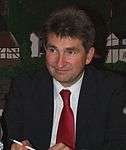North Rhine-Westphalia state election, 2005
| | |||||||||||||||||||||||||||||||||||||||||||||||||||||||||||||||||||||||||||
| |||||||||||||||||||||||||||||||||||||||||||||||||||||||||||||||||||||||||||
| |||||||||||||||||||||||||||||||||||||||||||||||||||||||||||||||||||||||||||
| |||||||||||||||||||||||||||||||||||||||||||||||||||||||||||||||||||||||||||
The North Rhine-Westphalia state election, 2005, was conducted on May 22, 2005, to elect members to the Landtag (state legislature) of North Rhine-Westphalia in Germany. It was a victory for the Christian Democratic Union, who received enough seats to form a coalition with their preferred partner, the FDP, and end the previous government formed by the Social Democratic Party and the Greens, who also ruled at the federal level.

Issues and Campaign
Leading up to the election, the state was run by a coalition of the Social Democratic Party and the Greens, with Peer Steinbrück as minister-president.
For much of 2004, there had been speculation that if the opposition Christian Democratic Union were to win this election, they would gain a two-thirds majority in the national upper house, the Bundesrat, and force a new election for the Bundestag by making the country ungovernable for Gerhard Schröder's coalition. Following the CDU's loss of a majority in Saxony, this risk was alleviated; however, North Rhine-Westphalia had been governed by the SPD alone or in coalition since 1966, so a defeat there would be perceived as a grave blow to the SPD.
Leading up to the election, polling in the state indicated a consistent lead (from 5-11% depending on agency) for a coalition of the CDU and the FDP over the SPD-Green share. In general, high German unemployment and the unpopularity of the national SPD and the Hartz IV reforms appeared to have taken a toll. Polls did indicate that SPD state leader Steinbrück was personally more popular than CDU state leader Jürgen Rüttgers, though.
This election marked the debut of the Labor and Social Justice Party, a new party formed by activists disenchanted with what they consider the neoliberal leanings displayed by the SPD.
Results
Official results are as follows. Note that overall seat totals have been reduced, lowering the seat counts for all parties.
Voter turnout was at 63%, an increase of 7% over the previous election in 2000. Previous to the election, some analysts had predicted that a CDU victory might result from disenchanted SPD voters staying home, but the turnout figures appear to reject this scenario.
| Party | Party List votes | Vote percentage (change) | Total Seats (change) | Seat percentage | ||
|---|---|---|---|---|---|---|
| Social Democratic Party (SPD) | 3,059,074 | 37.1% | -5.7% | 74 | -28 | 39.6% |
| Christian Democratic Union (CDU) | 3,695,806 | 44.8% | +7.9% | 89 | +1 | 47.6% |
| Free Democratic Party (FDP) | 508,354 | 6.2% | -3.7% | 12 | -12 | 6.4% |
| Alliance '90/The Greens | 509,219 | 6.2% | -0.9% | 12 | -5 | 6.4% |
| Labour and Social Justice Party (WASG) | 181,886 | 2.2% | +2.2% | 0 | +0 | 0.0% |
| National Democratic Party (NPD) | 73,959 | 0.9% | +0.9% | 0 | +0 | 0.0% |
| Party of Democratic Socialism (PDS) | 72,982 | 0.9% | -0.2% | 0 | +0 | 0.0% |
| The Republicans | 67,282 | 0.8% | -0.3% | 0 | +0 | 0.0% |
| All Others | 74,810 | 0.9% | +0.5% | 0 | +0 | 0.0% |
| Totals | 8,243,372 | 100.0% | 187 | -44 | 100.0% | |
Post-election
Jürgen Rüttgers announced his intention to form a coalition with the FDP and form a government for the state. This would be the first non-SPD government in North Rhine-Westphalia since 1966.
Further, SPD party leader Franz Müntefering and German Chancellor Gerhard Schröder unexpectedly announced preliminary plans to call an early federal election in autumn 2005, saying that the current federal coalition needed a fresh mandate to continue with reforms.
Sources
References
- ↑ In 2007 the deputy Rüdiger Sagel left the Greens and joined the Left Party
| Wikimedia Commons has media related to North Rhine-Westphalia state election, 2005. |



